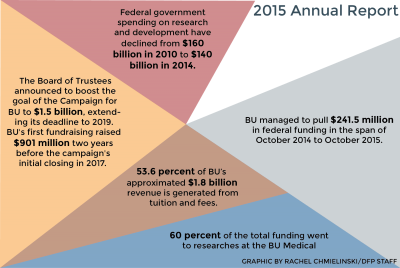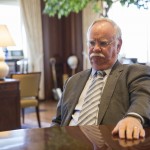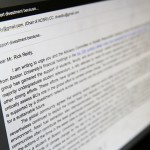
Boston University released the 2015 Annual Report Tuesday, which highlighted the university’s overcoming challenges amid an “unsettled research environment.” Introduced to the BU community through an email from BU President Robert Brown, the report mentioned efforts to tackle hurdles in research funding.
Federal funding for research became more challenging in recent years, Brown wrote in the email.
Federal government spending on research and development has declined from $160 billion in 2010 to $140 billion in 2014, the report stated. BU’s federal research fund has also declined. Seventy-four percent of the $326.5 million for sponsored research from the federal government showed a decline from $407 million in the year 2010, the report stated.
Though it has been an “intense” competition for research funding, “[BU has] continued to make remarkable progress in disciplines spanning the breadth of Boston University and contributing to solutions to the significant challenges that face mankind,” Brown wrote in the email.
In September 2015, the Board of Trustees announced it would boost the goal of the Campaign for BU from $1 billion to $1.5 billion, which will extend its run through 2019. BU’s first comprehensive fundraiser had raised $901 million as of Sept. 30, 2015 — two years before the campaign was initially expected to close in 2017.
BU managed to pull $241.5 million in federal funding in the span of October 2014 to October 2015 to support researchers in a variety of fields, the report stated. Better communication between researchers and the public, more investment in laboratories and science centers and further fostering and challenging the student body are a number of things the report mentioned to have driven the research nature at BU.
Gloria Waters, vice president and associate provost for research, said research is one of the more critical components to creating a generation of new knowledge and innovation. Waters said she hopes students will learn more about research happening at BU.
“It is important for students and others to understand the role BU plays in generating new knowledge, the excellent work that our faculty carries out and the considerable resources that we put into trying to help solve many issues currently confronting society,” Waters wrote in an email. “I hope students take the opportunity to be involved in research as part of their undergraduate education.”
Paul Lipton, program director of the Undergraduate Research Opportunities Program, said UROP aims to ensure that students interested in research are given all the appropriate resources, such as access to faculty members.
“There are real accomplishments being made at all levels, and that’s a tremendous thing to recognize, that each one of us is a part of that,” Lipton said. “We have done a lot of work to ensure undergraduates have access to the same resources grad students do. That’s really important for people outside the university to recognize.”
Twelve percent of BU’s sponsored research came to BU from the government through other sponsors, while the rest came from foundation grants and support from the private sector in addition to the 74 percent from the federal government, the report stated. Sixty percent of the total funding went to researchers at the BU Medical Campus, the report stated.
BU spokesperson Colin Riley clarified that the majority of funding given to BUSM is also because the “two biggest funders” of university research in the country are the National Institutes of Health and the National Science Foundation.
“The research funding is won by and earned by people who file grant proposals through sponsored programs,” Riley said, “The vast majority of sponsored research traditionally, historically has been primarily at the Medical Campus. Of course, we have a lot going on in engineering, biomedical research and in other type of research on the Charles River Campus as well.”
The report also stated a “healthy fiscal year” for the university. BU generated a total of $119.6 million in net operating gains from $1,762,147,000 of operating revenues in which 53.6 percent of the revenue came from tuition and fees. BU’s total operating expense is reported to amount to $1,642,578,000, in which 49.9 percent of the expenses went to instruction and departmental research.
Several students said publicizing the university’s research endeavors emphasized the importance and advantage of taking part in a variety of research opportunities.
Shraddha Gupta, a third-semester graduate student in the College of Communication, said research opportunities for students are important, and the availability of a report like this helps the school’s reputation.
“Universities are ranked based on more than just their academics,” she said. “People look at a school’s infrastructure and community presence, what advantages the students might get out of partnerships and research the school might do. So making information like this public makes sense to support the school’s image.”
Caitlin Connelly, a sophomore in the College of Arts and Sciences, said her position as a research assistant made her realize how helpful research opportunities are in supporting her academic career.
“Having an opportunity to study something in a setting outside the classroom helped me make decisions about where I wanted my academic studies to go,” she said. “I’ve been able to see what professors do in their fields and gain valuable experience from that.”
Eleanor King, a sophomore in the COM, said prioritizing research is important to creating opportunities for students to pursue their interests outside of the classroom.
“Having a public research report gives us a strong image in the eyes of people outside the BU community,” she said. “When we research things, we are not just a university. We become something bigger.”




